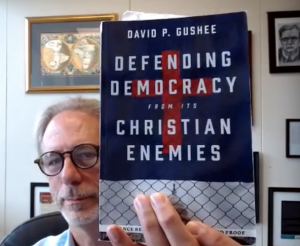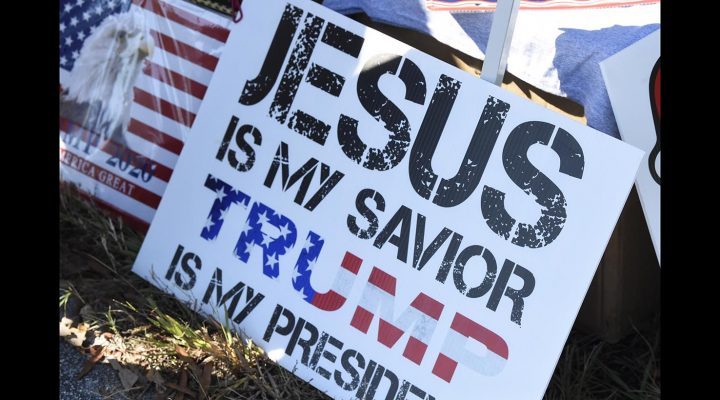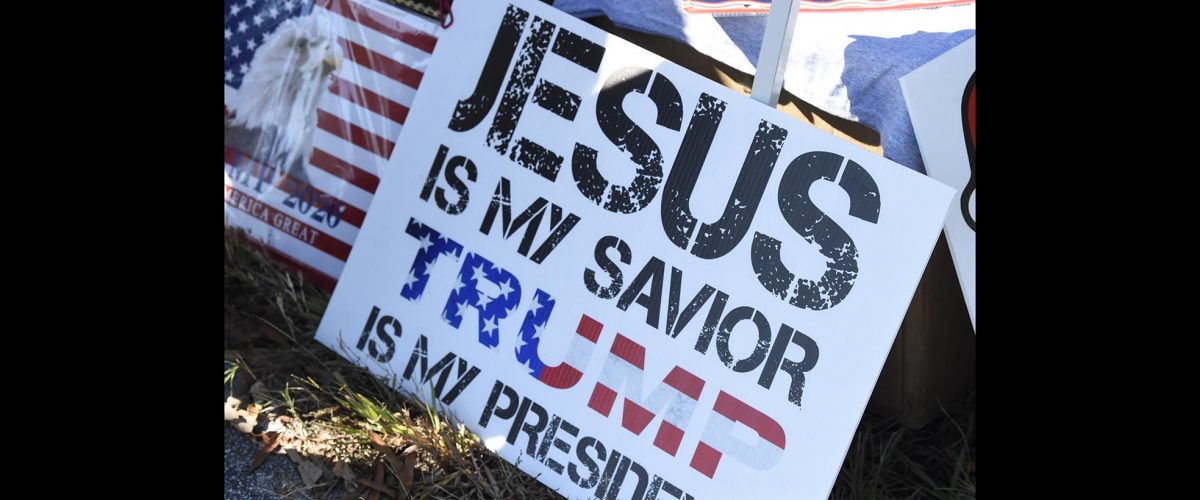Christ has become quite the nuisance to Christians bent on overthrowing U.S. democracy to establish a white-led Christian nation, Mercer University ethicist David Gushee said during a Sept. 6 webinar hosted by Baptist News Global.
“Jesus is a great inconvenience to a certain kind of authoritarian, reactionary, militant Christian,” Gushee asserted. “Turn the other cheek? Love your enemy? We’re not there at the moment. This is a time for war. Jesus is not convenient.”

David Gushee holds up a copy of his new book.
The ethicist and BNG columnist was invited to speak about his coming book, Defending Democracy from Its Christian Enemies, and to discuss why so many Christians have become hostile toward democracy in the United States and beyond.
During his conversation with moderator Mark Wingfield, executive director and publisher of BNG, Gushee addressed the surge in anti-democratic sentiments among some U.S. Christians, their infatuation with authoritarian regimes around the world, and their apparent willingness to use violence to achieve political aims.
Wingfield said he was stunned by author Russell Moore’s recent account of American pastors being labeled as ‘woke’ because they had preached from the Sermon on the Mount.
“If Jesus gets in the way of us doing what we think we want to do, then maybe we ought to reconsider what we want to do.”
Gushee agreed that’s a frightening development: “Jesus is inconvenient to Christians who want a different agenda, and that should terrify us. And that does remind me of some of the worst moments in Christian history. If Jesus gets in the way of us doing what we think we want to do, then maybe we ought to reconsider what we want to do.”
One point to consider is just how rare democracy is, Gushee said. “Democracy should be understood as an achievement in the sense that, throughout most of human history, people were not governed by democracies. They were governed by somebody bigger and more powerful than them telling them what the rules were going to be: monarchies, dictatorships, oligarchies of a small group of powerful landowners, the feudal system and dictatorships of various types.”
It’s no wonder many are shocked to learn there are those who want to end the democracy today, he added. “We thought our democracy was stable and permanent with agreed-upon rules, and that everybody valued it. But now the revelation of the last few years is that that’s not true.”
American democracy, however, has not been perfect, he said.
“One thing you end up having to acknowledge is that our democracy has always been damaged by our racism. Our democracy was established by white, landowning men, a significant percentage of whom owned human beings. And anybody who knows American history knows that our democracy was damaged from the beginning.”
There also have been times when democracy was used as a cover to achieve U.S. interests abroad, he added. “A lot of times we’ve said we’ve been about advancing democracy when it’s really been about advancing commercial interests or a kind of an imperial or semi-imperial vision.”
“We knew that, of those three systems, democracy was the one that was best for human beings and that was most in keeping with core Christian commitments.”
Yet, democracy kept the country from monarchy in its early years and later served as a stark contrast to sinister political systems around the world, Gushee said. “In the middle of the 20th century, we knew the difference between a democratic political order and a fascist political order like in Germany, and a communist political order, like in the Soviet Union and eventually in China. And we knew that, of those three systems, democracy was the one that was best for human beings and that was most in keeping with core Christian commitments.”
That faith figures prominently into democracy is a lesson Gushee said he learned from his mentor Glen Stassen, a prominent ethicist and Baptist theologian who died in 2014. “He was proud to say the Baptists made such a strong contribution to the separation of church and state, the disestablishment of religion, the development of a democracy that did not privilege Christianity, but in which Christians could participate along with other people.”
Wingfield asked how religion came to be connected with American democracy when the Bible is replete with references to the kingdom of God, Christ the King and other hierarchical concepts.
“We learned lessons from history,” Gushee responded. “We learned that the marriage of church and state, as Southern Baptists used to say, is bad for both. I remember hearing Richard Land say that. The marriage of church and state is bad for both. And what’s better for both is a free church and a free state.
“And we learned that the theocratic visions, visions in which God is the ruler, always involve some group of human beings representing and speaking for God. And always those human beings happen to be us because we’re the ones who are right. We’re the ones who know what God wants.”
“You need some ethics and theology and church history to learn lessons to take you into a pro-democratic posture.”
A naïve, non-historical reading of Scripture has led some Christians to believe Jesus wants to rule America through them, he said. “How could we have any non-Christians or non-evangelicals be in charge because this is God’s world? How could we not want Jesus written into the Constitution because Jesus is Lord? In other words, you need some ethics and theology and church history to learn lessons to take you into a pro-democratic posture. And I fear those lessons have been gradually frittered away and that many American Christians have lost contact with the lessons learned that led to Christian support for democracy in the past.”
Donald Trump effectively captured the spirit of the anti-democratic impulse by engaging in nostalgia politics as expressed through his “Make America Great Again” campaign, Gushee said. “I call it authoritarian, reactionary Christianity. I like that phrase somewhat better than ‘Christian nationalism’ because the word ‘reactionary’ is really important here. Picture people you know who are mainly outraged, appalled or terrified at how America is now. A lot of them have a label for what’s gone wrong: America has gone liberal, decadent or woke. God has been pushed out of public life.”
Americans frustrated by that perception have simultaneously lost confidence in democracy and other traditional approaches to solving social and political challenges, he added. “Missions and evangelism aren’t working. Educating kids in Christian values isn’t working. The political process isn’t working the way people think it should. And so, increasingly, people are flirting with radical ideas. Maybe we need a takeover that is more aggressive. Maybe violence is required.”
It certainly is according to former Arkansas Gov. Mike Huckabee, Gushee noted, who took to his TBN television show recently to warn the 2024 presidential election will be the last decided by ballots if Trump is kept from running or is defeated due to the criminal cases against him.
“He said it will be be bullets next time,” Gushee said. “And Huckabee used to be a Baptist pastor. It’s that kind of rhetoric indicating a radicalization of people who are saying well, OK, forget the niceties of democratic politics, maybe we need to storm the Capitol, maybe we need to talk about bullets in an environment of fear and intimidation. And radicalization is what I’m talking about. The mainstreaming of radicalization has happened during the last decade or so.”
That radicalization incorrectly supposes strong differences cannot be addressed without resorting to violent conflict, he explained. “Part of the definition of democracy is not that we don’t have disputes, but that we resolve them nonviolently through the political process. We deeply, fundamentally disagree about things, and we submit our disagreements to the political process of voting in elections. And if we lose, we may be bitterly disappointed, but we don’t get out the guns and start shooting people and we don’t rush the Capitol and start threatening to hang people.”
One of the goals of his new book, he said, is to demonstrate that many Christians already have adopted a “holy war mindset” toward the deficiencies they perceive in the country and are “flirting with, blessing or engaging in violence. And that’s part of the story of January 6.”
However, there also are those within the movement who seek to undermine democracy through “administrative deconstruction” instead of through violence, and they are drawing inspiration from authoritarian regimes around the world for guidance, Gushee said.
He devotes a chapter of Defending Democracy to Viktor Orbán, the Hungarian prime minister who has assumed control of the nation’s media and judiciary and altered the country’s electoral process to keep himself in office. Orbán has become the darling of U.S. conservatives like pundit Tucker Carlson, who recently interviewed him on the need to restore Trump to the White House. He also has spoken at CPAC gatherings in the U.S. where he condemned homosexuality and described liberalism as a virus.
“Orbán’s strategy is looking very appealing to a significant community of people who share this vision of a world that has gone liberal and needs to be resisted.”
“It’s the administrative deconstruction of democracy by a Christian strongman, and Orbán’s strategy is looking very appealing to a significant community of people who share this vision of a world that has gone liberal and needs to be resisted. They don’t want bloodshed, but they do want the results they want even if it involves tinkering with democracy so that democracy itself is gradually deconstructed.”
But the Hungarian leader was by no means the first hero of far-right Christians and politicians, Gushee said, recalling Franklin Graham praising Russian President Vladimir Putin a decade ago for restoring Christian values in that country.
“There are connections between Putin and Orbán and American Christian conservatives. And then there are connections with (Brazilian dictator Jair) Bolsonaro. People are learning from each other through rhetoric that is shared online. Strategies that are discussed. It is especially appealing in post-Christian countries, or in countries that are becoming post-Christian, that have a resentful Christian population that doesn’t like the changes.”
Wingfield noted the concept of American exceptionalism used to include extolling the nation as a democratic one. But that language seems to have been dropped by conservatives more recently, he said.
Gushee agreed, and said the omission is intentional: “America was chosen by God to be God’s special people. But America is kicking that away because of wokeness and liberalism. We need tough, strong Christian men, and some women, too, to restore us to the right path. The exceptionalism would not be in democracy, the exceptionalism would be in God’s special choice of America. But because liberalism is ruining that, as the argument goes, we might need to push back using extraordinary means.”
The movement also is helped by the rise of conspiracy thinking, he said. “There’s a loss of contact with reality in some significant ways. There’s also a heightening up of cosmic dualism — good versus evil. QAnon conspiracy thinking really helps to make this clear. It isn’t just that we disagree with Hillary Clinton, it’s that she’s running some kind of child-trafficking ring out of a pizza joint in D.C. Some people believe that. It’s extraordinary.”
Gushee termed what they want “Christian nation-ism,” as opposed to the more commonly labeled “Christian nationalism.”
Christian nation-ism is the belief “that America should be a certain kind of Christian nation in which a certain vision of Christianity prevails in the public square, a nation that is patriarchal, that is dominated and led by white people, that is either officially, culturally and overwhelmingly Christian, that has not accepted homosexuality and transgender, and that holds traditional values.”
“This is a period of moral panic, and my book is about how this moral panic is threatening democracy itself.”
Gushee said he wants to convey a warning about the anxiety driving these dangerous perceptions. “This is a period of moral panic, and my book is about how this moral panic is threatening democracy itself. In this book I’m also writing to defend democracy itself. Will it survive this period of panic? I’m genuinely worried about it.”
But when asked if there is any hope for American democracy, Gushee said there is. “That our democracy held under extreme pressure from November 2020 to January 2021 gives me hope. The most powerful officer in the land was actively attempting to undermine the results of a democratic election, and he failed. The fact that the courts have consistently sided with the rule of law and that now a bunch of people are indicted or in jail for what happened after November 2020, these are a sign of hope.”
The defeat of numerous extremist candidates in the 2022 elections is another sign of hope, Gushee said. “And the young people who know in their bones that this crazy politics of the right wing, maybe of their parents and grandparents, has nothing to do with Jesus, there’s hope there. Not a lot of young people are attracted to this. They know there’s something wrong here and they’re moving in resistance to it. That gives hope.
“We have a depth to the history of our democracy and the civil society organizations that are committed to democratic norms, and they don’t go away easily. They’re not going to go down without a fight. That gives me hope.”
View a video of the webinar here.


